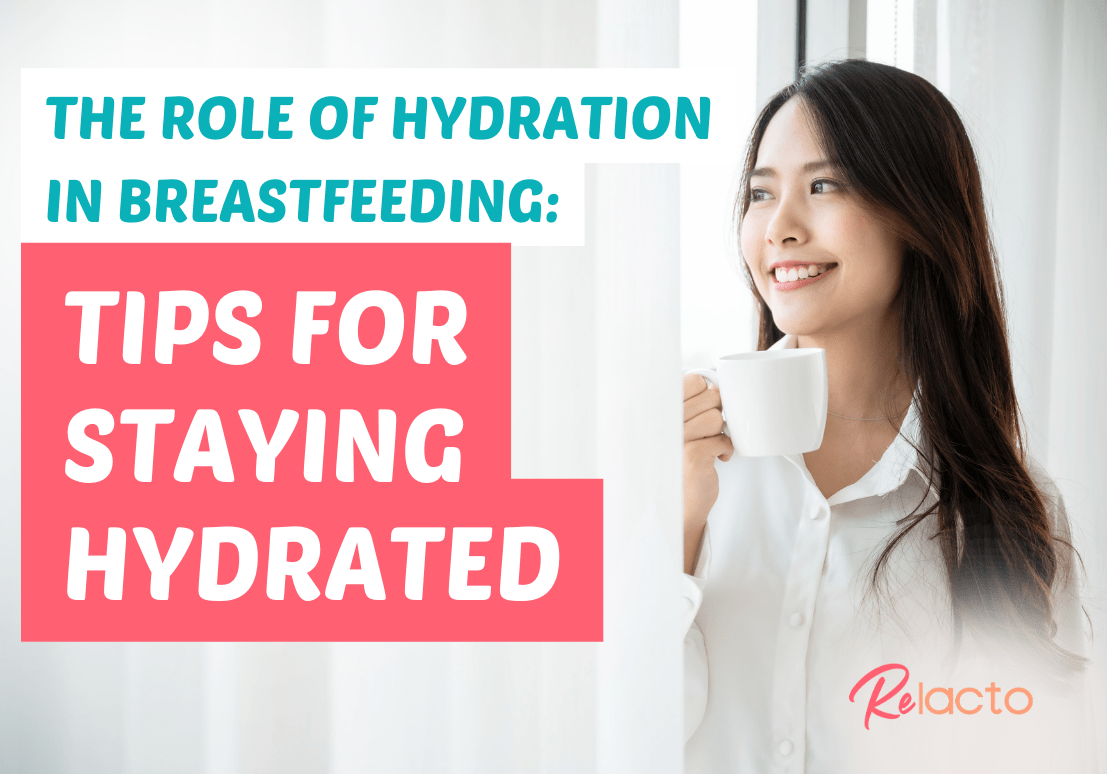The Role of Hydration in Breastfeeding: Tips for Staying Hydrated

Breastfeeding is a journey. You’ve embarked on it, and now it’s your responsibility to nourish your little one. But remember yourself in the process. You need plenty of hydration to stay healthy for you and your baby.
You may be thinking, ‘I’m already drinking enough water,’ but are you?
When breastfeeding, you’ll require more than usual to keep up with milk production.
We’re here to give some tips on staying hydrated during this stage of motherhood because dehydration can have severe consequences for both mom and baby.
Importance Of Hydration For Nursing Mothers
Staying hydrated during breastfeeding is like filling a well that nourishes both mother and baby. Nursing mothers often face increased fluid loss and milk production demands.
Proper hydration benefits nursing moms by promoting good health and energy levels and supporting optimal milk production.
Drinking water consistently throughout the day is essential to prevent dehydration while breastfeeding. In severe cases, mothers do experience constipation due to dehydration which would then lead to more discomfort to mothers.
A helpful tip is to keep a water bottle within reach at all times, making it easy to take sips between nursing sessions or whenever thirst strikes.
Nursing mothers can overcome potential setbacks by maintaining proper hydration and providing their little ones with everything they need for growth and development.
According to experts, lactating mothers should drink about 128 ounces (or 16 cups) of water per day and other good liquids such as juice, milk, broths, herb teas, and soups. However, research has found that nursing parents do not need to drink more fluids than necessary to satisfy their thirst. Having a glass of water is also recommended each time you nurse your baby. Exercise and high temperatures will increase your need for liquids.
Recognising Signs Of Dehydration
As we have seen, staying hydrated is crucial for nursing mothers. Now let’s focus on identifying and addressing dehydration symptoms during this period.
Dehydration symptoms can be subtle or severe, depending on the level of fluid loss. Some common signs include dark yellow urine, dry mouth, dizziness, fatigue, and headache.
If you suspect you’re becoming dehydrated while breastfeeding, taking action quickly is essential—delaying rehydration remedies could lead to more significant health issues and breastfeeding challenges. Drink water or electrolyte-rich fluids like coconut water or sports drinks to help replenish lost fluids; however, avoid caffeine and sugary beverages as they may worsen the situation. Additionally, try eating hydrating foods such as watermelon, papaya or cucumbers.
As a nursing mother, it is vital to recognise these dehydration symptoms and implement proactive measures. Keep a bottle of water nearby and try to drink even before feeling thirsty – your body needs constant hydration when producing milk for your baby.
By prioritising self-care this way, you’ll ensure optimal health and nourish your little one without unnecessary complications.
Establishing A Daily Fluid Intake Goal
Establishing a daily fluid intake goal is crucial. Fluid tracking helps monitor hydration levels during breastfeeding.
Use smartphone apps or journals to record water consumption. This ensures adequate intake for both mother and baby, promoting overall health.
Hydration reminders can be set on phones or smart devices. Regular alarms keep mothers mindful of their fluid needs.
Maintaining electrolyte balance is also essential as it supports proper body functioning. Incorporate moderate amounts of beverages like coconut water and sports drinks into the diet.
With consistent efforts, staying hydrated becomes second nature for breastfeeding mothers.
Incorporating Hydrating Foods Into Your Diet
Having established your daily fluid intake goal, it’s time to explore the tasty and nourishing world of hydrating foods. These can help you reach your hydration targets and provide essential nutrients for you and your baby.
Kick off with hydrating snacks like cucumber slices, watermelon chunks, or orange wedges perfect for munching between meals.
Smoothie benefits go beyond just hydration; they contain vitamins and minerals from fruits and vegetables, vital during breastfeeding. It can feasibly be a nutritious sweet treat to enjoy in between meals. Try blending strawberries, spinach, almond milk, and a dollop of Greek yoghurt for a refreshing treat.
Soup varieties such as vegetable broth or miso soup make great options for lunch or dinner – they’re packed with flavour while adding extra fluids to your diet.
Remember to balance these hydrating food choices with adequate water intake to ensure optimal health throughout your breastfeeding journey.
Creating A Hydration Schedule

A hydration schedule can be beneficial in managing breastfeeding challenges. It ensures there is enough water intake to support milk production.
Keep track of daily fluid consumption by setting specific times for drinking liquids throughout the day. Use technology, such as smartphone apps or alarms, as hydration reminders.
Focus on consuming nursing warm beverages like water, coconut water, and herbal teas to provide essential nutrients needed during breastfeeding.
A consistent routine will help maintain proper hydration levels, ensuring both mother and baby stay healthy during this crucial time.
Foods And Drinks To Improve Lactation And Stay Hydrated
Now that you have a hydration schedule, it’s time to explore some foods and drinks that can help improve lactation and keep you hydrated.
A well-rounded diet is essential for maintaining your health during breastfeeding, but there are specific foods to improve lactation while providing additional hydration.
Lactation smoothies are an excellent choice because they often include fruits and veggies with high water content and ingredients like oats that may potentially support with milk supply.
Herbal teas, such as fenugreek or fennel tea, also offer dual benefits: increasing breastmilk production while helping you meet your daily fluid intake goals.
Coconut water is another excellent option due to its natural electrolytes and hydrating properties.
Experimenting with lactation food Singapore options allows you to find what works best for your body, keeping both mother and baby healthy throughout the breastfeeding journey. It’s important to know that there is no one-size-fits-all approach to breastfeeding. Your body and baby will tell you what they need, and it’s up to you as a mother to listen and adjust accordingly.
Conclusion
So, you thought breastfeeding was just about feeding your little one? Remember, mama: staying hydrated is crucial for you and your baby during this beautiful nursing journey. In every meal, focus on consuming the best foods to increase breast milk.
So raise those water bottles with pride – cheers to happy breastfeeding and optimal hydration!
Are you ready to experience the comfort of wholesome, dietitian-curated meals delivered fresh and warm to your doorstep daily? Get in touch with us for a gentle invitation to nourish your body and soul now.







